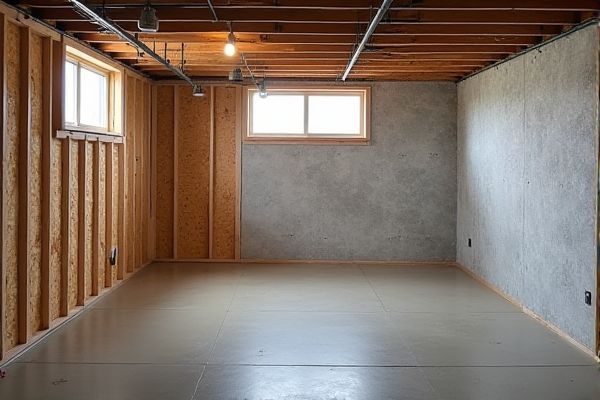
An insulated basement provides enhanced temperature regulation, reduces energy costs, and prevents moisture buildup compared to an uninsulated basement, which often experiences cold drafts and higher humidity levels. Discover how proper insulation can improve your home's comfort and durability by reading the rest of the article.
Table of Comparison
| Feature | Insulated Basement | Uninsulated Basement |
|---|---|---|
| Thermal Efficiency | High; reduces heat loss and maintains stable temperature | Low; prone to cold drafts and temperature fluctuations |
| Energy Cost | Lower heating and cooling expenses | Higher heating and cooling expenses |
| Moisture Control | Improved moisture barrier with insulation and vapor barriers | Higher risk of dampness and mold growth |
| Comfort | Warmer floors and more comfortable living space | Cold floors, less comfortable for living or storage |
| Resale Value | Higher resale value due to added energy efficiency | Lower resale value |
| Installation Cost | Higher initial investment | Lower installation cost |
Introduction to Basement Insulation
Basement insulation significantly improves energy efficiency by reducing heat loss and preventing moisture buildup in below-ground spaces. Insulated basements maintain stable indoor temperatures, lowering heating costs and increasing comfort during cold seasons. Uninsulated basements often experience dampness and higher energy consumption due to poor thermal resistance and air infiltration.
Key Differences: Insulated vs Uninsulated Basements
Insulated basements maintain consistent indoor temperatures by reducing heat loss through walls and floors, improving energy efficiency and comfort levels. Uninsulated basements often experience higher humidity and temperature fluctuations, leading to increased risks of mold growth and structural damage. Effective insulation materials such as rigid foam or spray foam create a thermal barrier that enhances moisture control and long-term durability of basement spaces.
Energy Efficiency and Cost Savings
An insulated basement significantly improves energy efficiency by reducing heat loss and maintaining a stable indoor temperature, which can lower your heating and cooling costs throughout the year. Uninsulated basements often lead to increased energy consumption as heat escapes through foundation walls, resulting in higher utility bills. Investing in proper basement insulation provides long-term cost savings by enhancing your home's overall thermal performance and minimizing energy waste.
Moisture Control and Mold Prevention
Insulated basements significantly improve moisture control by reducing condensation on cold surfaces, which prevents mold growth and structural damage. Uninsulated basements are more prone to dampness as they allow temperature fluctuations that cause moisture buildup, increasing the risk of mold and mildew. Properly insulating your basement helps maintain a stable environment, protecting your home's foundation and indoor air quality from moisture-related issues.
Comfort and Indoor Air Quality
Insulated basements significantly improve comfort by maintaining stable temperatures and reducing drafts, which can prevent moisture buildup and mold growth. Better insulation contributes to enhanced indoor air quality by minimizing condensation and limiting the intrusion of outdoor pollutants and allergens. Your living space will feel healthier and more comfortable year-round with proper basement insulation.
Installation Methods for Basement Insulation
Installation methods for insulated basements typically involve rigid foam boards or spray foam insulation applied directly to the basement walls and sometimes the floor, creating an effective thermal barrier that reduces heat loss and moisture infiltration. In contrast, uninsulated basements lack these protective layers, resulting in colder, damp environments that can increase energy costs and risk of mold growth. You can improve your basement's comfort and energy efficiency by choosing the appropriate insulation technique suited to your home's structure and local climate conditions.
Long-Term Durability and Maintenance
An insulated basement enhances long-term durability by preventing moisture buildup and reducing the risk of mold and structural damage, ensuring a stable environment for your home. Uninsulated basements are more susceptible to temperature fluctuations and condensation, which can accelerate wear and require frequent maintenance. Investing in proper insulation safeguards your basement's structural integrity and minimizes costly repairs over time.
Impact on Home Value and Resale
An insulated basement significantly increases your home's value by improving energy efficiency, comfort, and potential livable square footage, which appeals to buyers. Uninsulated basements often lead to higher utility costs and moisture issues, deterring potential purchasers and lowering resale value. Investing in proper insulation enhances the overall marketability and return on your property.
Common Myths About Basement Insulation
Many believe insulated basements always prevent moisture problems, but improper installation or lack of vapor barriers can still lead to dampness and mold. Another common myth is that uninsulated basements naturally stay dry and comfortable, yet they often experience higher humidity and heat loss, increasing energy costs. Insulating basements properly with materials like rigid foam or spray foam insulation enhances thermal performance and indoor air quality, debunking the notion that insulation is unnecessary or harmful.
Choosing the Right Basement Solution for Your Home
Insulated basements regulate temperature by reducing heat loss, preventing moisture buildup, and enhancing energy efficiency, which can lower your utility bills. Uninsulated basements, while cheaper initially, may lead to higher heating costs and increased risk of mold due to condensation. Selecting the right basement solution depends on your climate, budget, and long-term comfort goals.
 homyna.com
homyna.com